Page 106 of 352 pages « First < 104 105 106 107 108 > Last »
Official notice of counter claim

Description:
Notice of counter claim number 92. Official notice ot the Reverend John Maynard of Gloucestershire and Shepheard Teas, borough of Devon, that a counter claim had been filed in Nevis, for the compensation due on the slaves belonging to Walter Maynard.
The Abolition, or end, of slavery happened in 1834.
The slave owners and their supporters accepted the loss of their property (slaves) in return for compensation (money) from the government. £20 million was paid to slave owners by the British government, as compensation for this loss. Slave owners in Bristol received over £500,000 (worth about £25 million today); a vast sum at that time.
Date: unknown
Copyright: Copyright Bristol University
Particulars for compensation claim

Description:
Particulars of claim by Job Ede, Colhouns Estate, Nevis for 134 slaves. With counter claims noted from Charles Pinney (annuity on estate for £200 per year) and John Frederick Pinney and John Matthew Williams (mortgages on estate). Counter claims were issued where someone had an interest in the estate, eg had lent money to the owners, or had a claim on an inheritance. Charles Pinney was the son of John Pinney, a wealthy plantation owner and sugar merchant.
The Abolition, or end, of slavery happened in 1834.
The slave owners and their supporters accepted the loss of their property (slaves) in return for compensation (money) from the government. £20 million was paid to slave owners by the British government, as compensation for this loss. Slave owners in Bristol received over £500,000 (worth about £25 million today); a vast sum at that time.
Date: unknown
Copyright: Copyright Bristol University
Compensation due on 107 slaves
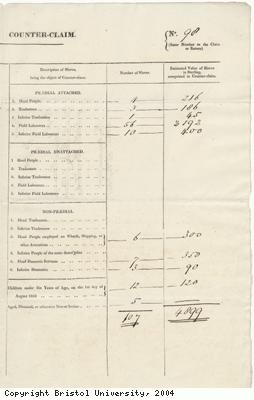
Description:
Counter claim number 98 by Charles Pinney to the compensation due on 107 slaves in the possession of Walter Maynard, 19th Aug 1835. New River Estate.
Counter claims were issued where someone had an interest in the estate, eg had lent money to the owners, or had a claim on an inheritance.Charles Pinney was the son of John Pinney, a wealthy plantation owner and sugar merchant.
The Abolition, or end, of slavery happened in 1834.
The slave owners and their supporters accepted the loss of their property (slaves) in return for compensation (money) from the government. £20 million was paid to slave owners by the British government, as compensation for this loss. Slave owners in Bristol received over £500,000 (worth about £25 million today); a vast sum at that time.
Date: 19th Aug 1835
Copyright: Copyright Bristol University
Official notice of counter claim

Description:
Notice of counter claim number 92. Official notice ot the Reverend John Maynard of Gloucestershire and Shepheard Teas, borough of Devon, that a counter claim had been filed in Nevis, for the compensation due on the slaves belonging to Walter Maynard.
The Abolition, or end, of slavery happened in 1834.
The slave owners and their supporters accepted the loss of their property (slaves) in return for compensation (money) from the government. £20 million was paid to slave owners by the British government, as compensation for this loss. Slave owners in Bristol received over £500,000 (worth about £25 million today); a vast sum at that time.
Date: unknown
Copyright: Copyright Bristol University
Compensation due on 107 slaves
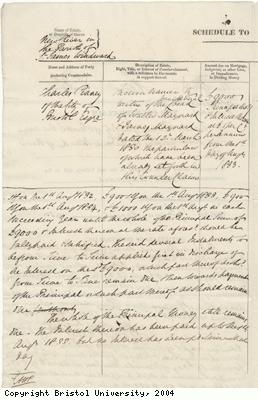
Description:
Counter claim number 98 by Charles Pinney to the compensation due on 107 slaves in the possession of Walter Maynard, 19th Aug 1835. New River Estate.
Counter claims were issued where someone had an interest in the estate, eg had lent money to the owners, or had a claim on an inheritance. Charles Pinney was the son of John Pinney, a wealthy plantation owner and sugar merchant.
The Abolition, or end, of slavery happened in 1834.
The slave owners and their supporters accepted the loss of their property (slaves) in return for compensation (money) from the government. £20 million was paid to slave owners by the British government, as compensation for this loss. Slave owners in Bristol received over £500,000 (worth about £25 million today); a vast sum at that time.
Date: 19th Aug 1835
Copyright: Copyright Bristol University
Compensation due on 40 slaves

Description:
Counter claim by Charles Pinney to the compansation due on 40 slaves, in the possession of Maria Huggins, a plantation owner.
People with a financial interest in an estate could counter claim against the owner. Charles Pinney was the son of John Pinney, a wealthy plantation owner and sugar merchant.
The Abolition, or end, of slavery happened in 1834.
The slave owners and their supporters accepted the loss of their property (slaves) in return for compensation (money) from the government. £20 million was paid to slave owners by the British government, as compensation for this loss. Slave owners in Bristol received over £500,000 (worth about £25 million today); a vast sum at that time.
Date: Aug 1835
Copyright: Copyright Bristol University
Compensation due on 40 slaves
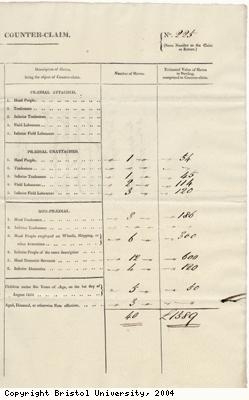
Description:
Counter claim by Charles Pinney to the compansation due on 40 slaves, in the possession of Maria Huggins, a plantation owner.
People with a financial interest in an estate could counter claim against the owner. Charles Pinney was the son of John Pinney, a wealthy plantation owner and sugar merchant.
The Abolition , or end, of slavery happened in 1834.
The slave owners and their supporters accepted the loss of their property (slaves) in return for compensation (money) from the government. £20 million was paid to slave owners by the British government, as compensation for this loss. Slave owners in Bristol received over £500,000 (worth about £25 million today); a vast sum at that time.
Date: Aug 1835
Copyright: Copyright Bristol University
Compensation claims for freed slaves
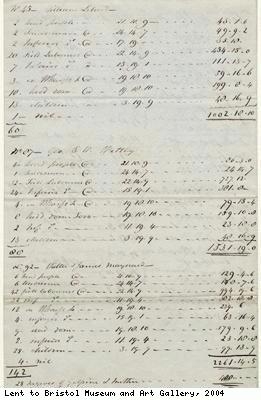
Description:
Pinney papers.
List of slaves on various estates in Nevis, for compensation claims made by owner/s at Emancipation (end of slavery),
in 1834. Lists slaves by trade (head people, tradesmen, field labourers, inferior labourers etc and their value for compensation. Charles Pinney still held slaves – gained in compensation.
The slave owners and their supporters accepted the loss of their property (slaves) in return for compensation (money) from the government. £20 million was paid to slave owners by the British government, as compensation for this loss. Slave owners in Bristol received over £500,000 (worth about £25 million today); a vast sum at that time.
Date: 1834(?)
Copyright: Lent to Bristol Museum and Art Gallery
Compensation claims for freed slaves
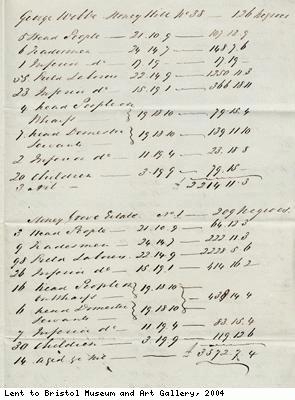
Description:
Pinney papers.
List of slaves on various estates in Nevis, for compensation claims made by owner/s at Emancipation (end of slavery),
in 1834. Lists slaves by trade (head people, tradesmen, field labourers, inferior labourers etc and their value for compensation. Charles Pinney still held slaves – gained in compensation.
The slave owners and their supporters accepted the loss of their property (slaves) in return for compensation (money) from the government. £20 million was paid to slave owners by the British government, as compensation for this loss. Slave owners in Bristol received over £500,000 (worth about £25 million today); a vast sum at that time.
Date: 1834(?)
Copyright: Lent to Bristol Museum and Art Gallery
Compensation claims for freed slaves

Description:
Pinney papers.
List of slaves on various estates in Nevis, for compensation claims made by owner/s at Emancipation (end of slavery),
in 1834. Lists slaves by trade (head people, tradesmen, field labourers, inferior labourers etc and their value for compensation. Charles Pinney still held slaves – gained in compensation.
The slave owners and their supporters accepted the loss of their property (slaves) in return for compensation (money) from the government. £20 million was paid to slave owners by the British government, as compensation for this loss. Slave owners in Bristol received over £500,000 (worth about £25 million today); a vast sum at that time.
Date: 1834(?)
Copyright: Lent to Bristol Museum and Art Gallery
Page 106 of 352 pages « First < 104 105 106 107 108 > Last »

